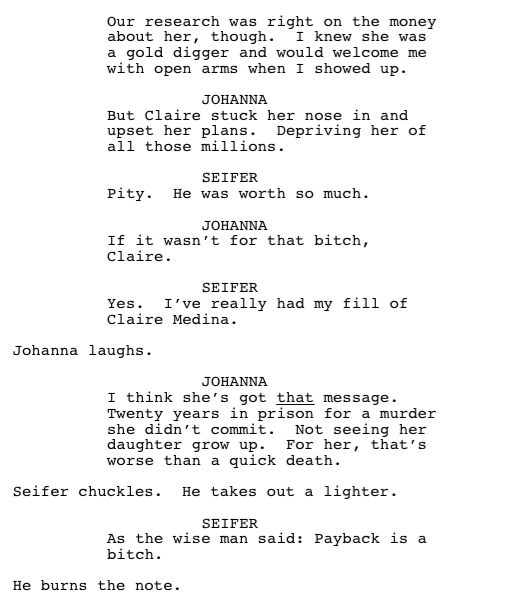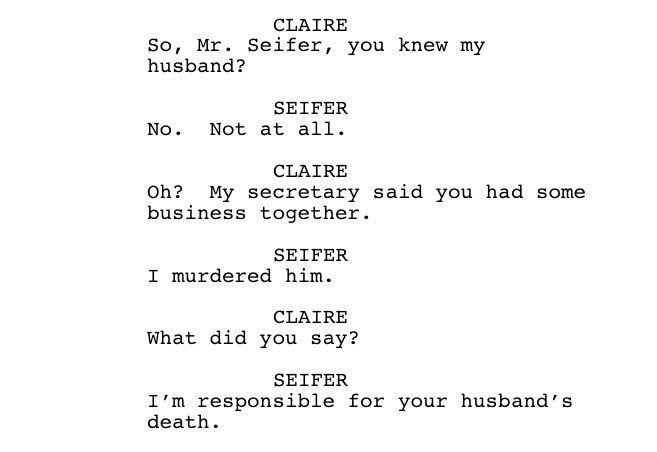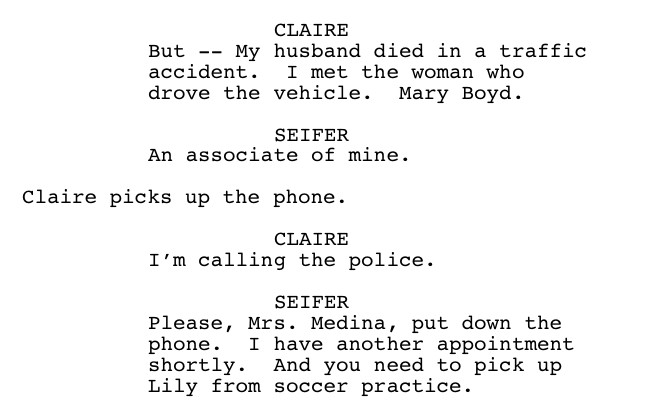Get Your Script Reviewed On Scriptshadow!: To submit your script for an Amateur Review, send in a PDF of your script, along with the title, genre, logline, and finally, something interesting about yourself and/or your script that you’d like us to post along with the script if reviewed. Use my submission address please: Carsonreeves3@gmail.com. Remember that your script will be posted. If you’re nervous about the effects of a bad review, feel free to use an alias name and/or title. It’s a good idea to resubmit every couple of weeks so your submission stays near the top.
Genre: Psychological Thriller
Premise (from writer): A young widow discovers her husband’s accidental death is the latest in a series of murders-for-profit reaching back more than a decade.
Why You Should Read (from writer): This is based on my published novel. In its review, Mystery Scene magazine described the book as “a story Hitchcock would have approved of.” Exactly what I was striving for.
Writer: John Joseph Moran
Details: 118 pages
 Christoph Waltz for Seifer? No-brainer.
Christoph Waltz for Seifer? No-brainer.
Scripts that start out fun always seem to have an advantage over ones that don’t. It takes more effort to get into those moody reads and even when you do, they never quite read as fast as the fun ones. I’m not saying you should never write a drama, of course. But in the competitive world of spec writing where every variable counts, picking up something that moves quickly sure makes things easier.
And that’s the experience I had with The Benefactor. Even at 117 pages, it never really slowed down. But why do I still have a case of the reluctants when thinking about it? Something about it feels… how do I put it? Light. There’s a level of sophistication missing, which left my suspension of disbelief in constant flux. The Benefactor destroyed the Amateur Offerings competition two Saturdays ago so I know a lot of you read it. Maybe, then, you can help me figure out why I felt this way.
When 35 year-old Claire Medina’s husband is hit and killed by a car, it’s bittersweet. On the one hand, he was her husband and father to her daughter. On the other, he was abusive and an altogether terrible person. As much as Claire hates to admit it, there’s a freeing feeling to her husband being out of her life. It’s almost too good to be true.
It turns out that’s exactly the case. A month later, Claire is approached by the sinister Nikolas Seifer, who informs her that he runs a unique business. He finds troubling individuals, individuals that spouses or family members wouldn’t mind dead, and he kills them in what looks to be an unfortunate “accident.” Afterwards, he approaches the spouse and asks for half of their fortune as payment for improving their lives.
Half Claire’s fortune is a lot of money. So Claire tries to find something on Seifer to use against him. But this guy is clever. He’s implicated Claire for the murder of her husband in several ways in case she doesn’t pay up.
Eventually, Claire realizes the best option is to give Seifer the cash and be done with it. So that’s what she does. But 18 months later (yes, you read that right – we have an 18 month time jump), Seifer appears again and tells Claire that to complete the loop, she has to kill someone for Seifer, his next mark.
Claire decides to turn the tables though, encouraging her mark, Fanning, to fake his death in order to take down Seifer. As her and Fanning wait for their plan to take shape, they fall for one another. But just as they believe they’ve cornered Seifer, he turns the tables back on them, and Claire finds herself fighting for her life, as she’s implicated for the murder of Fanning’s wife, a murder she didn’t commit.
This was a wild one. Lots of twists and turns here. The danger with a lot of twists and turns though, is that unless you’re extremely diligent, you’re bound to create some plot holes. There were a good half-a-dozen times here where I stopped and went, “Waaaait a minute. Couldn’t they just…?”
Like Seifer’s system. It’s a clever premise, don’t get me wrong. A hitman predicts that you want your spouse dead and therefore does it for you, only asking for the money afterwards so there’s no way for you to get caught. The catch is, he extorts you for the money.
But why only target “bad” people in this scheme? Since he’s extorting the people for money afterwards either way, can’t he technically do this to anyone, bad or good? What’s the advantage of only targeting bad people? I suppose it’s a little easier to deal with someone who kinda likes the fact that their asshole husband is dead. But nobody’s going to be thrilled when you demand half their fortune for the hit, whether they hated their hubby or not.
That’s what’s so frustrating about this script. It kept me reading all the way through. I wanted to find out what happened in the end. Yet it was littered with these lazy story pockets that weren’t believable for some reason or another. And again, it went back to a lack of sophistication. Let me show you a snippet of dialogue. Here, Seifer and his cohort, Johanna, are discussing how Fanning’s wife turned on Claire and their plan, allowing Seifer to gain the upper hand against them.
This is so over-the-top and on-the-nose, you can practically hear the sound of Seifer twirling his mustache, with Johanna “MUWHAHAHAING” in the background.
You may also notice the “explainy” nature of the dialogue (“Twenty years in prison for a murder she didn’t commit…”). There is a TON of this throughout the script. “Why can’t we go to the police?” “Because if Character A tells Character B we went to the police then it’ll mean we’re screwed. But if we follow Option C instead, then…”
Explainy dialogue almost always means the writer is using his characters to talk to the reader instead of his characters talking to each other. This is why this dialogue feels stilted and artificial, because it’s being directed at the wrong person. Dialogue must always, first and foremost, sound like two characters talking to each other. As soon as one of them stands up on their “explanation soapbox” to address the reader directly, you’ve pierced the reader’s suspension of disbelief.
And that problem was persistent throughout much of the screenplay. Too much of the dialogue felt “off” for one reason or another. Take this exchange early in the script. Four weeks after her husband’s death, Claire is sitting in her office when Seifer arrives. Here’s the exchange.
While I don’t think this is terrible dialogue, it rang false (to me, at least). If someone says to you, “I murdered your husband,” are you really going to respond with, “But – My husband died in a traffic accident. I met the woman who drove the vehicle. Mary Boyd.” Someone just told you they are a murderer and you’re responding with a conversational rebuttal?
I could see freaking out. I could see realizing you’re in danger and enacting some sort of stall tactic while you figure out what to do. At the very least, note Claire freezing when she hears these chilling words. But without clarification, it reads like the ho-hum response of someone who’s just been accused of leaving the iron on. It’s emblematic of issues I had with the dialogue throughout.
The other big problem here has to do with time. Remember that unless you’re doing a period piece, you want the time frame for you movie to be as contained as possible. Any big time jumps mean a loss of momentum. But they also mean a lack of planning. It’s indicative of a writer who hasn’t worked hard enough to keep his story moving in one continuous timeline.
I mean the 18 month time jump is nothing short of a momentum assassination. If there’s any way to eliminate it, I’d do it. And then there’s Claire going to jail and the subsequent courtroom trial, which is another huge time jump. You have yourself a thriller here. You don’t want to end up in a boring courtroom drama sequence. Case in point. Imagine if Silence of the Lambs ended in a courtroom case. Do you think it’d still be considered a classic?
As soon As Claire goes to jail, get her out on bond, and have her and Fanning find and confront Seifert. It makes no sense to have your main character sitting in jail while this Fanning character, who we met less than 30 pages ago, searches for our villain.
Speaking of Fanning, I thought for sure he was going to turn out bad. I thought the whole idea behind Seifer’s system was that he targeted evil people. With Claire disrupting the system, I believed the irony would be that she’d pay the price. Fanning would end up doing something horrible to her. But even if you don’t explore that avenue, it seemed weird that all these people Seifer had killed previously were terrible human beings, yet Fanning turned out to be a great guy.
Anyway, I think Moran deserves some props for coming up with a unique premise and an unpredictable story that moves from start to finish. But to get this up to “worth the read” territory or higher, he needs to shore up some of the dialogue issues. I mean this is a “Hitchcock-like” story and I don’t remember a single conversation that included dramatic irony. Watch Psycho and note how nearly every dialogue scene contains dramatic irony (one character is lying to another). Fix that and the excessive time jumps and The Benefactor is going to be the real deal.
Script link: The Benefactor
[ ] what the hell did I just read?
[x] wasn’t for me (just missed a ‘worth the read’)
[ ] worth the read
[ ] impressive
[ ] genius
What I learned: Beware of characters being too “explainy” (“Why can’t we go to the police?” “Because a) it means blah blah, b) that would entail blah blah blah, and c) the villain would blah blah us”). Either cut all this explaining out or look for other ways to convey the message. For example: “Why can’t we go to the police?” Claire pulls out a newspaper with the headline, “Man Found Dead in Car.” “This is the last guy who tried to go to the police.”




